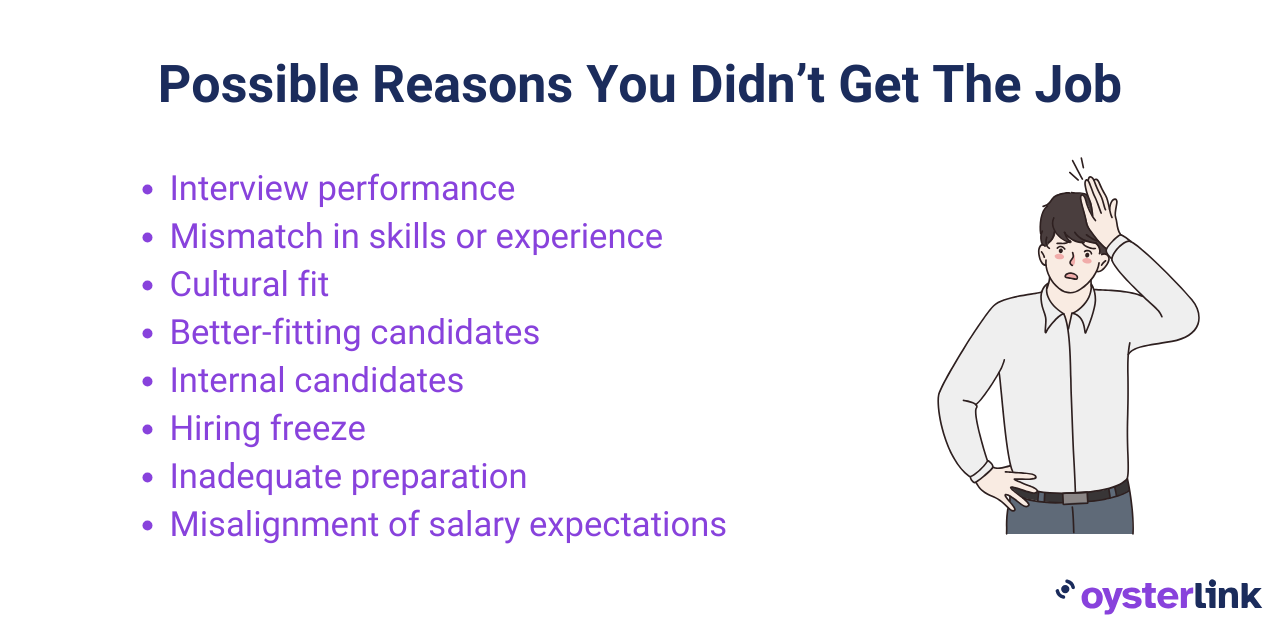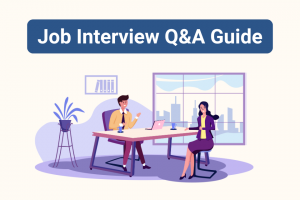If you’ve been waiting for weeks with no response, it’s natural to feel frustrated. Discover how to turn this challenging moment into a valuable learning experience and explore potential reasons why you didn’t land the job in this article.
Understanding the Emotional Impact of Job Rejection
Experiencing job rejection can evoke a range of emotions, including disappointment, frustration, and self-doubt. Recognizing and accepting these feelings is a crucial step toward emotional resilience. It’s important to understand that rejection is a common part of the job search process and does not reflect your overall worth or professional capabilities.
Engaging in self-care practices, such as mindfulness or speaking with supportive friends and family, can help in managing these emotions effectively.
10 Possible Reasons You Didn’t Get the Job
Not getting the job can occur due to a wide range of reasons and it’s often a combination of factors rather than a single issue.
Possible reasons you didn’t land the role include:
- Interview performance: The interview is one of the critical elements of a job hunt, as it demonstrates your suitability for the role. This includes your answers, communication, confidence and enthusiasm for the position.
- Mismatch in skills or experience: The role may require skills that you don’t currently have. For example, the role might require knowledge of a particular software, which you never used before.
- Cultural fit: Hiring the ideal candidate is also based on how well they align with a company’s culture, not just the skills. If your values, work style or personality don’t align with the company’s culture, it might be a reason for not getting the offer.
- Better-fitting candidates: Other candidates might have been a better fit for the job, in terms of skills, experience or rapport with the team.
- Internal candidates: Companies might have internal candidates in mind for the role, making it tough for external applicants to get the job.
- Hiring freeze: Positions are sometimes put on hold or canceled due to cost cuts or organizational restructuring.
- Inadequate preparation: Not researching about the company, not understanding the role fully or being unable to effectively convey your skills and experiences can hinder your chances of securing the job. It may signal a lack of interest and commitment to both the role and the company.
- Misalignment of salary expectations: If your salary expectations were higher than what was offered, employers might choose a candidate with more aligned financial expectations.
- Incomplete or inaccurate application: Inconsistencies in your employment history, such as unexplained gaps, can raise red flags on your resume.

What To Do When You Don’t Get the Job
While not landing the job can be disheartening, there are methods to transform this experience into a positive stepping stone for your career.
1. Navigate Your Emotions
It’s common to feel a wide range of emotions, including disappointment, frustration and even self-doubt.
Acknowledge these feelings without being too hard on yourself. Remember that job rejections don’t define your worth or capabilities.
To help navigate your feelings:
- Foster resilience and determination to achieve your professional goals
- Ask your family and friends for emotional support
- Speak to a therapist who can help equip you with strategies to manage negative emotions, if needed
2. Reflect on the Interview Process
Take some time to reflect on the interview process. Consider what went well and what didn’t. What were your strengths and weaknesses? Did you prepare for the interview? Or maybe your lack of confidence outshined your knowledge?
Reflecting on the interview questions can help you identify areas for improvement and prepare for future job opportunities.
To reflect on the interview process:
- Review the interview questions and your responses.
- Assess your body language, communication and interpersonal skills during the interview. For example, did you maintain consistent eye contact throughout the interview?
- Develop a plan to enhance your interview skills and confidence for future opportunities. For example, you can perform mock interviews with friends to practice your responses and receive constructive feedback.
3. Ask for Feedback
When requesting feedback from potential employers, consider asking specific questions to gain detailed insights. Inquire about particular skills or experiences that could strengthen your candidacy or aspects of your interview performance that could be enhanced. This targeted approach not only demonstrates your commitment to professional growth but also provides actionable advice for future applications.
4. Learn From the Experience
Utilize the feedback you received — together with your reflections — to improve your overall approach to job hunting. This can include enhancing your soft skills, practicing your interview techniques and reassessing the types of roles you’re applying for.
Take this challenge as an opportunity to improve your resume and cover letter, develop a more effective method to showcase your strengths and gain a better understanding of what potential employers are looking for.

5. Contact Your Network and Seek Support
Connect with industry professionals and join professional associations to expand your career circle.
In addition, networking can help you find new job opportunities and get a fresh perspective on your job search strategy.
To get in touch with your network:
- Identify and list existing professional contacts, including colleagues and mentors. Then, email them or give them a call to reconnect with them.
- Attend industry-related events, conferences or seminars to meet new professionals and explore potential job openings or referrals
- Join online forums or social media platforms that are relevant to your field of work
6. Improve Your Skills
Consider enrolling in online courses, attending workshops, or obtaining certifications relevant to your desired field. Engaging in volunteer work or freelance projects can also provide practical experience and demonstrate initiative to potential employers. By proactively enhancing your skill set, you not only increase your marketability but also build confidence in your professional abilities.
7. Maintain Contact
If you still see yourself as a good fit for the role you applied for, communicate with the interviewer one to two months after your initial application. Write an email to the human resources department and inquire about new openings that match your qualifications.
Highlight any new skills or experiences you’ve acquired since your last interview, as this demonstrates your commitment to professional growth.
8. Practice Self-Care
Job searching can be stressful, making it important to take care of your physical and mental health. Engage in activities that you enjoy and can help you relax. For example, you can practice calming exercises, such as meditation or yoga, to help reduce stress.
Allocate time for these activities, making sure that you have a healthy balance between your job-searching efforts and well-being. By looking after yourself, you’ll be in a healthier mental state to approach your job hunt with positivity and resilience.
9. Develop a Resilient Mindset
Building resilience is essential in navigating the ups and downs of the job search journey. Adopting a growth mindset allows you to view rejection as a learning opportunity rather than a setback. By focusing on continuous improvement and remaining adaptable, you can maintain motivation and enhance your chances of success in future endeavors.
10. Maintain a Positive Outlook and Stay Persistent
Job searching can be a lengthy and challenging process, but maintaining a positive attitude is crucial. Celebrate small victories along the way, such as securing an interview or making a new networking connection. Remember that each rejection brings you closer to the right opportunity. Staying persistent and optimistic will not only improve your mental well-being but also reflect positively during interviews and networking interactions.
How To Respond to a Job Rejection Email
Responding to a job rejection email can be a valuable opportunity to maintain professionalism and potentially keep the door open for future opportunities.
- Say thank you: Thank the interviewer for considering your application to demonstrate professionalism and leave a positive impression.
- Express continued interest: If you are still interested in working for the company, notify the interviewer that you would like to be considered for future opportunities.
- Be direct and positive: Keep your response short and direct to ensure clarity and maintain a professional tone. Avoid unnecessary details or expressions of disappointment.
- End on a positive note: Acknowledge something positive you have learned or observed about the company during the interview process, such as the company’s emphasis on employee development.
Find the Ideal Job With OysterLink
OysterLink can help provide you with the essential knowledge for finding the right job that suits your expertise. Our goal is to help you efficiently navigate the career path you want while making informed decisions about potential job opportunities.
FAQ
ocus on small, actionable goals, like tailoring your resume for a specific role or networking with industry professionals. Celebrate each milestone, no matter how small, to keep your spirits up.
Yes, it’s a great way to identify areas for improvement. Politely request feedback by thanking them for their time and asking for suggestions to enhance your skills or approach in the future.
Reflect on the feedback received, refine your resume and cover letter, and practice interview skills. Consider upskilling through courses or certifications relevant to your field.
Absolutely. It’s a natural reaction to disappointment. Acknowledge your feelings, seek support from friends or mentors, and take proactive steps to focus on future opportunities.
Use it as a learning opportunity to assess your strengths and areas for improvement. Strengthen your skills, expand your professional network, and refine your job search strategy to position yourself better for the next opportunity.

Written by Lidija Misic
Lidija holds a BA in English Language and has lived in five different countries, where she has worked in various roles, including as a flight attendant, teacher, writer and recruiter. Her biggest passion is crafting great content and reading. She is particularly passionate about creating punchy copy that inspires people to make positive changes in their lives.

Reviewed by Marcy Miniano
Marcy is an editor and writer with a background in public relations and brand marketing. Throughout her nearly decade-long career, she has honed her skills in crafting content and helping build brands across various industries — including restaurant and hospitality, travel, tech, fashion and entertainment.




